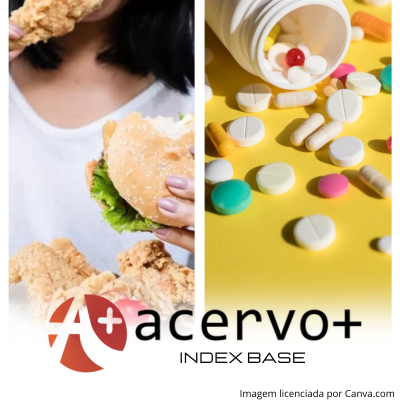Abordagem dos psicoestimulantes na compulsão alimentar
##plugins.themes.bootstrap3.article.main##
Resumo
Objetivo: Demonstrar a abordagem dos psicoestimulantes na compulsão alimentar, não considerando apenas os aspectos clínicos do transtorno, mas também os contextos sociais, culturais e psicossociais em que os pacientes estão inseridos. Revisão bibliográfica: O impacto da compulsão alimentar na qualidade de vida dos indivíduos é profundo e multifacetado. Além dos efeitos físicos adversos, como o aumento do risco de doenças crônicas, os episódios de compulsão alimentar podem levar a sentimentos de vergonha e baixa autoestima, prejudicando significativamente o bem-estar psicológico e social dos pacientes. A Lisdexamfetamina é o primeiro medicamento que recebeu aprovação para o tratamento da compulsão alimentar, os estudos demonstraram redução significativa dos sintomas de compulsão. No entanto, a heterogeneidade dos estudos clínicos disponíveis podem dificultar a interpretação dos resultados e a generalização das conclusões para a prática clínica de muitos medicamentos. Considerações finais: Logo, é possível perceber que o uso de psicoestimulantes em pacientes com transtorno compulsivo alimentar possui um papel importante, principalmente em pacientes que não possuem bons resultados com outras terapias, como a psicoterapia ou cirurgia. Entretanto, é evidente a necessidade de mais estudos em diversos níveis.
##plugins.themes.bootstrap3.article.details##
Copyright © | Todos os direitos reservados.
A revista detém os direitos autorais exclusivos de publicação deste artigo nos termos da lei 9610/98.
Reprodução parcial
É livre o uso de partes do texto, figuras e questionário do artigo, sendo obrigatória a citação dos autores e revista.
Reprodução total
É expressamente proibida, devendo ser autorizada pela revista.
Referências
2. BLANCO-GANDIA MC, et al. Binge eating and psychostimulant addiction. World journal of psychiatry, 2021; 17(9): 517-529.
3. CITROME L. “Lisdexamfetamine for binge eating disorder in adults: a systematic review of the efficacy and safety profile for this newly approved indication - what is the number needed to treat, number needed to harm and likelihood to be helped or harmed?.” International journal of clinical practice, 2015; 69(4): 410-21.
4. FERRARINI NO, et al. Alternativas terapêuticas farmacológicas para transtorno da compulsão alimentar: uma revisão sistemática. Debates em Psiquiatria, Rio de Janeiro. 2023;13: 1-15.
5. FORNARO M, et al. Lisdexamfetamine in the treatment of moderate-to-severe binge eating disorder in adults: systematic review and exploratory meta-analysis of publicly available placebo-controlled, randomized clinical trials. Neuropsychiatric disease and treatment, 2016; 12: 1827–1836.
6. GOMES SB, et al. Evolução histórica dos conceitos e critérios diagnósticos da bulimia nervosa e do transtorno da compulsão alimentar: uma revisão de literatura. Diálogos Interdisciplinares em Psiquiatria e Saúde Mental, 2021; 1(1): 60-69.
7. GUERDJIKOVA AI, et al. Pharmacotherapy of binge-eating disorder: current and future directions. Expert Opinion on Pharmacotherapy, 2015; 16(10): 1469-1478.
8. HEAL DJ, et al. Stimulant prodrugs: A pharmacological and clinical assessment of their role in treating ADHD and binge-eating disorder. Advances in Pharmacology, 2023.
9. HILBERT A, et al. Meta-análise sobre a eficácia a longo prazo de tratamentos psicológicos e médicos para transtornos da compulsão alimentar periódica. Jornal internacional de distúrbios alimentares, 2020; 53(9): 13-53-1376.
10. HUDSON JI, et al. Implications of the DSM-5 binge eating disorder diagnosis for the DSM-IV diagnoses of morbid obesity and night eating syndrome. International Journal of Eating Disorders, 2010; 43(7): 603-611.
11. LEOMBRUNI P, et al. The Role of Methylphenidate in Treating Binge Eating Disorder: A Systematic Review and Meta-Analysis. Journal of Clinical Medicine, 2021; 10(15): 3342.
12. LUCAS NNF, et al. Principais abordagens da terapia cognitivo-comportamental associadas às terapias farmacológicas no tratamento do transtorno de compulsão alimentar periódico. Seven Editora, 2023; 1794-1805.
13. MONTELEONE AM, et al. Pharmacological Treatment of Binge Eating Disorder: A Review of the Current Evidence and Future Directions. CNS Drugs, 2022; 36(1): 29-43.
14. MCELROY SL, et al. Pharmacological management of binge eating disorder. In: Agras WS, Robinson AH, editors. The Oxford Handbook of Eating Disorders. Oxford: Oxford University Press, 2012; 471–492.
15. MCELROY SL, et al. Lisdexamfetamine Dimesylate for Adults with Moderate to Severe Binge Eating Disorder: Results of Two Pivotal Phase 3 Randomized Controlled Trials. Neuropsychopharmacology, 2016; 41(5): 1251-1260.
16. NOGUEIRA JP, et al. Compulsão alimentar periódica: uma revisão. Revista de Psiquiatria Clínica, 2005; 32(3): 140-146.
17. PARK E, et al. The Role of Pharmacotherapy in Binge Eating Disorder: A Systematic Review and Network Meta-Analysis. Clinical Psychopharmacology and Neuroscience, 2021; 19(1): 35-48.
18. PASTURA G e MATTOS P. Efeitos colaterais do metilfenidato. Revisão de Literatura. Revista de Psiquiatria Clínica 2004; 31: 100–104.
19. QUADROS MRR, et al. Compulsão alimentar em pacientes no pré-operatório de cirurgia bariátrica. Psicologia Argumento, 2006; 24(45): 59-65.
20. QUILTY LC, et al. A randomized comparison of long acting methylphenidate and cognitive behavioral therapy in the treatment of binge eating disorder. Psychiatry research, 2019; 273: 467–474.
21. RASTRELLI G, et al. Stimulant Medications for the Treatment of Binge Eating Disorder: A Review of Current Evidence and Future Perspectives. CNS Drugs, 2021; 35(12): 1319-1330.
22. SILVA LVS. Farmacoterapia do Transtorno do Déficit de Atenção. Universidade Federal de Santa Catarina, 2020; 28-31.

